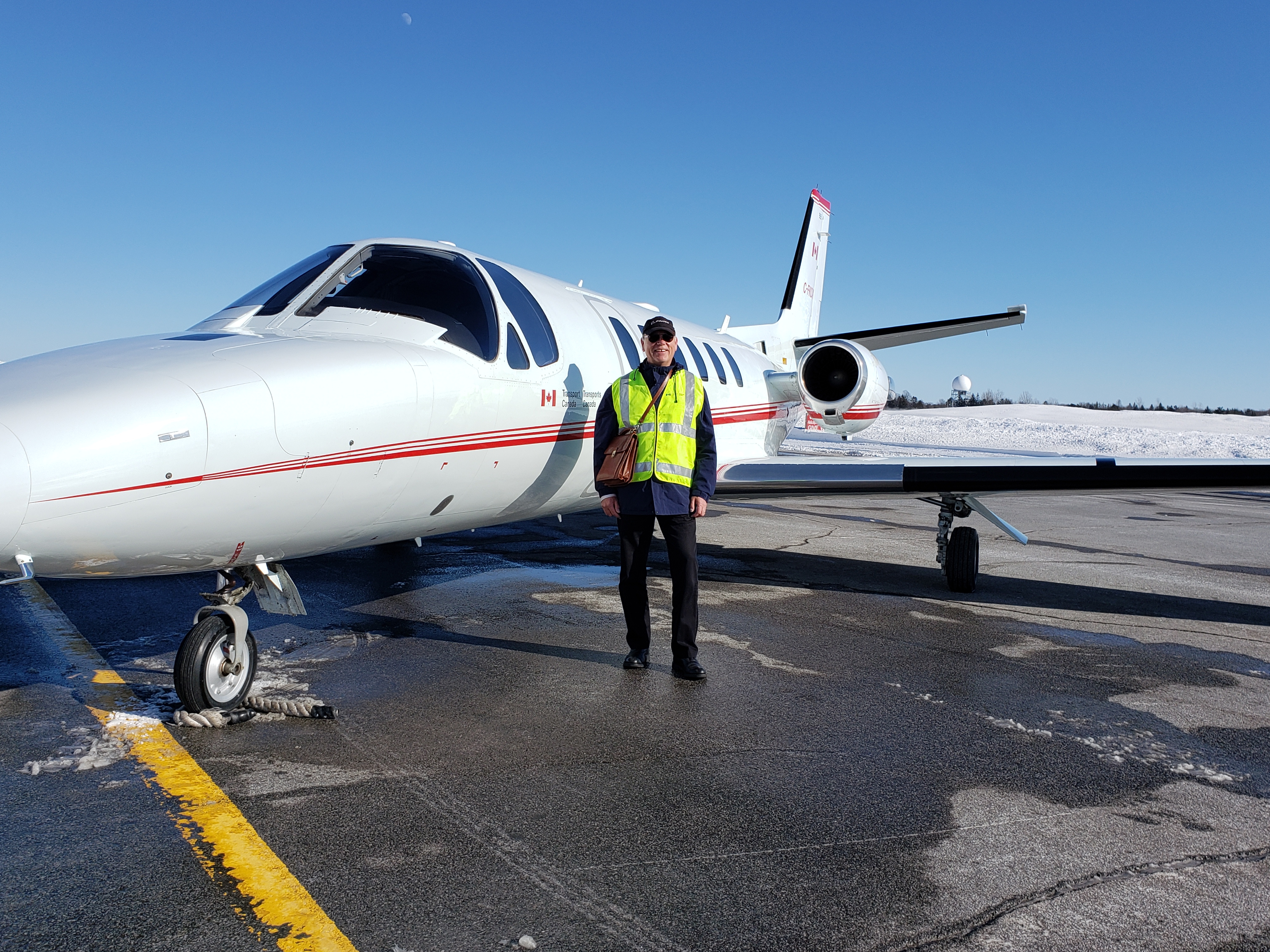Adversity can affect people in a variety of ways. Trauma can have long-lasting effects.
For Brad Fowles, Safety and Quality Assurance Inspector at Transport Canada’s Aircraft Services Directorate, tragedy and emergencies played significant roles in shaping his career, and his life. Traumatic incidents early in his career gave him a sense of direction.
“I started in aviation in 1980 as an instructor, and I saw an accident early in my career,” recalls Fowles. “I was the guy who grabbed a fire extinguisher and ran to help people.”
Not long after that, he was involved in a search for a lost aircraft… and he was the one who found the site where it had come down, including discovering the occupants.
“I’ve volunteered in safety roles ever since,” he said. “Safety has been my passion. It’s been my core.”
But wait… there’s more… in 1984, Fowles was in the cockpit (but not at the controls) when a plane crashed at an event in Europe. His family, he said, learned about it from news reports, even though he was imploring medical staff to get in touch with his wife to let her know he was fine. It was yet another experience that taught him another side of trauma.
So, in addition to volunteering for safety roles, he also helps as a volunteer when disaster assistance teams have needed somebody to communicate with families.
After years of working in the private sector, he joined Transport Canada in 2002.
More recently, in early 2020, he volunteered to help with the department’s COVID-19 pandemic response, and joined Transport Canada’s National Emergency Coordination Centre.
As Advanced Planning Unit Leader during the COVID-19 response, he coordinates departmental contingency planning efforts, identifies the department’s response capabilities for protecting Canadians, and ensuring Canada’s transportation system continues to function effectively.
Nora Johnson, Director of the National Emergency Coordination Centre, says this is an important role, both for handling immediate emergency situations and for future planning.
“Brad came to help us because of his operational background, and wide understanding of the department,” says Johnson. “He was a natural fit for the Advanced Planning Unit.
“Folks like Brad collect, gather and analyze data, and create products and plans to support executives in making critical decisions that protect life and maintain continuity of the transportation system, so that essential goods and workers can continue to move.”
Johnson says the Centre was growing gradually, but the COVID-19 pandemic created an urgent need to have it fully operational sooner than expected – and that happened successfully, thanks to people like Fowles.
“We fast-forwarded our operations in an agile way,” she says.
Fowles says this role has given him a great perspective on the federal response to COVID-19.
“I’ve travelled around the world for most of my life,” he said, “and now I’m inside Transport Canada, watching Canada respond, and I’m pretty impressed. We’re doing a pretty good job, and we’re going to learn from it.
“After 40 years of doing this, I’m so happy to be in a position to contribute in some small way.”
Fowles is a member of the International Society of Air Safety Investigators, and he’s the Transport Canada Aircraft Services Directorate representative to the Canadian Aviation Safety Officer Partnership (CASOP).
The CASOP brings together safety professionals from across Canada’s aviation community – including air operators, airports and NAV CANADA – to discuss safety issues and concerns, to share safety-related information, and to strengthen professional connections for addressing safety challenges.
Fowles’ career in the public service started at a time when Transport Canada had a particular need for people with his background. Canada’s air navigation services were being transitioned to a new, not-for-profit private entity – NAV CANADA. This innovative change meant that new regulatory oversight was needed.
“I had to focus on hiring the best and the brightest, as well as developing the policies, and we needed to focus on safety,” says Doug Mein, who at the time was Director, Air Navigation Service and Airspace at Transport Canada, and Fowles was one of the those people who was hired.
“I wanted people who believed in safety management systems,” says Mein. “Brad was focused on safety management. He was one of my main safety guys.”
That meant looking at aeronautical studies through a safety management lens.
“We developed a partnership with NAV CANADA,” said Mein. “We had a great, great team. We were kind of pioneers.”
Years later, including a stint where he went back to school to earn a degree in Emergency Management in 2016, Fowles is still with Transport Canada, still focused on safety, and the philosophy is still the same.
“When I teach Safety Management to Transport Canada employees,” says Fowles, “I often tell them about their value to Canadians. We look at the transportation safety record of countries that have a regulatory authority like Transport Canada, versus countries that do not have a good regulatory oversight system. The differences are striking. Transport Canada makes a real difference.”
He is also passing on his passion for safety to the next generation, inside and outside of Transport Canada. His son is a wildland firefighter, and his daughter works in health and safety policy review and implementation.
“Safety is a difficult business to work in, because it can get you down, but it’s worth it in the long run,” he says. “My kids grew up in this environment, and it’s infected them, as well. My kids are keeping the family passion for safety going, in careers related to it.”
